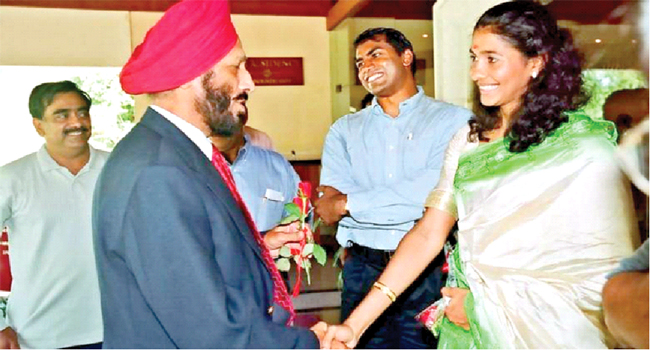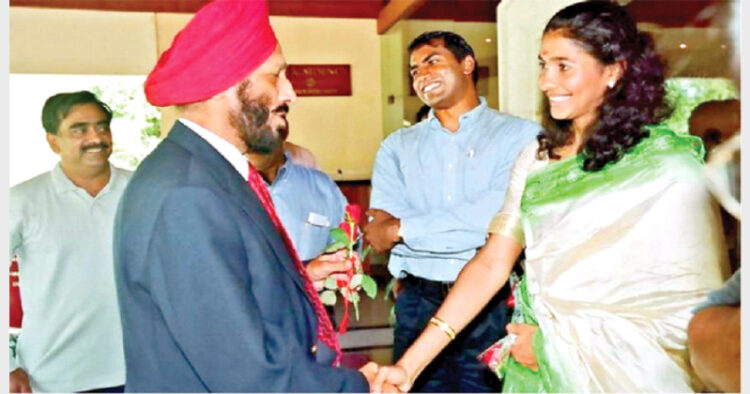There are many similarities between the sports careers of Milkha Singh and Anju Bobby George. But for the ace Long Jumper ‘Milkha Sir’ continues to be an epitone of humility and sportsmanship
-Sanjeeb Mukherjea

Athlete Anju Bobby George with Milkha Singh
One of India’s most decorated track athletes, Milkha Singh knew what it was to perform successfully on the international arena. The legendary Indian sprinter, who recently passed away, brought glory to the nation winning nearly all competitions that he took part in. No Indian track athlete has been able to emulate his 200m and 400m double gold medal winning act from the 1958 Asian Games. No Indian track athlete has managed to win an individual gold medal at the Commonwealth Games after Milkha’s star act in 1958. And it’s been six decades and some more years of trying. Alas, it’s Milkha’s one defeat, and not his multiple triumphs, that has been making headlines ever since.
India’s Olympic story has had its gold dust moments with a handful of individual Olympic medals. An overall haul of just 15 individual Olympic medals has always had the country thirsting for greater success at the grandest stage. While the winners have all gone on to become icons in their sport, Milkha Singh’s story of missing out on what could have been India’s first track medal at the 1960 Rome Olympics remains an unforgettable tale, one that continue to evoke awe, inspiration, and sighs of ‘what-if’ in the Indian sports fraternity. In the 61 years since Milkha’s race in Rome, only three Indians have made it to an Olympic track final; GS Randhawa (110m hurdles, 1964), Sriram Singh (800m, 1976) and the legendary PT Usha (400m hurdles, 1984).
Even as India waited for its next Olympic track finalists, long-jumper Anju Bobby George created history becoming the first Indian woman to qualify for an Olympic field event final when she made it to the final at the 2004 Athens Olympics. George’s progress to the final ensured that like track, India’s drought of Olympic field finalists was also broken after a long wait of 56 years. George in fact became only the third Indian athlete to do so, after high-jumper Gurnam Singh and triple-jumper Henry Rebello did make it to the finals in the 1948 Olympics.
A decorated long jumper, George achieved the historic feat of becoming the first Indian athlete to ever win at medal in a World Championships in athletics when she won the bronze medal clearing 6.70m in Long Jump at the 2003 World Championships in Paris. A gold medalist at the Asian Games, George went on to become India’s first and only world champion in the IAAF World Athletics Final when she won gold at Monte Carlo in 2005. But it is perhaps a tryst of fate that ensured an Olympic medal remained elusive for George, much like Milkha.
The 2004 Olympics at Athens saw a seemingly unwell George push herself to the limit as she leapt to a personal best of 6.83m in the Long Jump final. Marion Jones who claimed the fourth spot was later stripped of her position for an alleged doping offence, ensuring George to finish in fifth place. Russians Tatyana Lebedeva, Irina Simagina and Tatyana Kotova claimed the top three positions. But in the wake of the international dope scandal and reports of institutionalised doping by Russian athletes, the three Long Jump medal winners at Athens 2004 are under the scanner. In an ideal world, Anju Bobby George would then be pushed up to second place, and be a silver medalist, and more importantly become the first Indian Track and Field athlete to win an individual Olympic medal. Like Milkha, George knows the disappointment of that one medal that eluded her. For anju Bobby George, Milkha sir was always a role model.She waxed eloguent when asked about her inspriration, who according to her, was an epitome of humility and sportsmanship.
“More than anything, Milkha sir’s journey is a remarkable one. It has become so easy for many these days to talk about the past. But trust me, no one, none of us can even imagine where he came up from, and how. He literally came up from nowhere. And to drive yourself to such excellence in sports after what he went through at such a young age, it is unthinkable,” said Anju Bobby George.
Milkha’s X-Factor
According to George, it was simply his desire to excel in running that lifted his life out of the ordinary. “Look at his life, and what all he did to compete so successfully at the highest level. At that time, Indian athletics had no bearing whatsoever on the world stage. It was Milkha sir who single-handedly drove India on to the international sporting arena. People all over the world knew what a great champion he was, in fact I must say, he was our first true international superstar in sports, she said.
“You take a look at todays athletes, they have everything. From sporting facilities, good coaches, proper training regimens, technological aid, everything that is needed to compete on an even keel in world sport is available today. But when you look at the time Milkha sir ran, what did he have? Nutrition, proteins, good coaches, tech – absolutely nothing. I mean, he made himself a champion just by sheer hard work and determination. He just ran. Athletes today have such proper regimens to take care of their bodies, they have all sorts of conditioning coaches. But what did he have that made him so special? It was his burning desire that took him to a different level when he raced. He was all alone those days, yet he coped with the pressure to excel. Modern athletes need to learn that from him on how to cope on the big stage,” Anju Bobby George Said.
Meeting the Legend
Anju George remembered how Milkha Singh took pains to reach her village for a facilitation event. “I had returned after winning the bronze at the World Championships. It was a four-hour drive from Calicut to my village. And he came there with his wife. I remember it rained heavily that evening. But Milkha sir had boundless energy. He must have been 70 then. But he was young at heart. When he walked on to the stage, he had the entire village on its feet. And what a motivating speech he gave when he was on stage. There were many who couldn’t understand what he was saying, but I knew they believed in the great man. Later when he met my mother, he told her she was lucky to have me as her daughter. It was an unforgettable evening. I had just won a World Championship medal and was of course delighted, but it was Milkha sir that evening who gave me so much inspiration,” she said.
According to the Olympian, Milkha Singh continues to inspire generations. “From time to time, I watch his videos where he is speaking, sharing his experiences in sport and life. He is such a motivator. And his greatest quality I feel is his simplicity. Today, there are so many avenues for sportspersons to interact with their fans, like social media. But he was bigger than all of that—I mean a Milkha Singh never needed social media to motivate people. What he achieved 60 years ago is the greatest social message that every Indian, athlete or otherwise must learn to respect.”
“It was his heartfelt desire to see an Indian athlete win an Olympic medal in Track (and Field). When I returned from Athens after the 2004 Olympics, he came and met me in Delhi. I wasn’t well, yet I had given off my best, but a podium finish was not in store for me. He consoled me saying, ‘I suffered the same fate. The medal just slipped away from me. But you must not give up.’ I believe an Olympic medal for an Indian Track and Field athlete at Tokyo 2021 would be the perfect tribute to Milkha sir,” Anju Bobby George.
(The writer is a brodcaster- journalist)














Comments